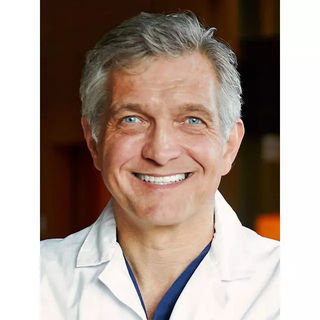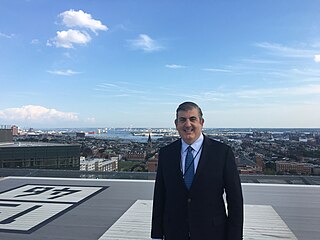
Neurosurgery or neurological surgery, known in common parlance as brain surgery, is the medical specialty concerned with the surgical treatment of disorders which affect any portion of the nervous system including the brain, spinal cord and peripheral nervous system.

Surgical planning is the preoperative method of pre-visualising a surgical intervention, in order to predefine the surgical steps and furthermore the bone segment navigation in the context of computer-assisted surgery. The surgical planning is most important in neurosurgery and oral and maxillofacial surgery. The transfer of the surgical planning to the patient is generally made using a medical navigation system.

Philip E. Stieg is an American academic physician and neurosurgeon. He has been the Neurosurgeon-in-Chief of NewYork-Presbyterian/Weill Cornell Medical Center since 2000.
Joshua B. Bederson is an American neurosurgeon, Leonard I. Malis, MD/Corinne and Joseph Graber Professor of Neurosurgery, and System Chair of Neurosurgery at the Mount Sinai Health System in New York City. He is a Fellow of the American College of Surgeons, and an attending neurosurgeon at The Mount Sinai Hospital.

Robert F. Spetzler is a neurosurgeon and the J.N. Harber Chairman Emeritus of Neurological Surgery and director emeritus of the Barrow Neurological Institute in Phoenix, Arizona. He retired as an active neurosurgeon in July 2017. He is also Professor of Surgery, Section of Neurosurgery, at the University of Arizona College of Medicine in Tucson, Arizona.

Roger Härtl is an American neurological surgeon at Weill-Cornell Medical College and NewYork-Presbyterian Hospital. He is the Director of Spinal Surgery at the Weill Cornell Brain & Spine Center. Härtl has been named by Becker's Spine Review as one of the Top 50 Spine Surgeons in the United States as well as one of the Top 10 Spine and Neurosurgeon Leaders at Non-Profit Hospitals. He was named one of New York's Top Doctors by New York Magazine after he saved the life of New York firefighter Eugene Stolowski.

Barrow Neurological Institute is the world's largest neurological disease treatment and research institution, and is consistently ranked as one of the best neurosurgical training centers in the United States. Founded in 1962, the main campus is located at 350 W. Thomas Road in Phoenix, Arizona.

Nicholas Theodore is an American neurosurgeon and researcher at Johns Hopkins University School of Medicine. He is known for his work in spinal trauma, minimally invasive surgery, robotics, and personalized medicine. He is Director of the Neurosurgical Spine Program at Johns Hopkins and Co-Director of the Carnegie Center for Surgical Innovation at Johns Hopkins.
Albert Loren Rhoton Jr., was an American neurosurgeon and a professor specializing in microsurgical neuroanatomy. He was on the editorial boards of six surgical journals, and worked as professor and chairman of the Department of Neurological Surgery at the University of Florida. He was also president of organizations such as the American Association of Neurological Surgeons, among other surgical organizations.

Michael L. J. Apuzzo is an American academic neurological surgeon, the Edwin M. Todd/Trent H. Wells, Jr. Professor Emeritus of Neurological Surgery and Radiation Oncology, Biology, and Physics at the Keck School of Medicine, of the University of Southern California. He is also editor emeritus of the peer-reviewed journals World Neurosurgery and Neurosurgery. He is distinguished adjunct professor of neurosurgery at the Yale School of Medicine, distinguished professor of advanced neurosurgery and neuroscience and senior advisor, at the Neurological Institute, Wexner Medical School, The Ohio State University, and adjunct professor of neurosurgery, Weill Cornell Medicine, Department of Neurological Surgery & Weill Cornell Brain and Spine Center.
Frank Henderson Mayfield, was an American neurosurgeon and founder of the Mayfield Clinic and Spine Institute in Cincinnati, Ohio. A pioneer in brain and spine surgery, he invented the spring aneurysm clip and the Mayfield skull clamp. Mayfield is best known for his clinical interests in peripheral nerve and spine injuries, development of neurosurgical instruments, and medical politics.

Aaron A. Cohen-Gadol is a professor of clinical neurological surgery at the Keck School of Medicine of USC.

Theodore H. Schwartz is an American medical scientist, academic physician and neurosurgeon.

James Rutka is a Canadian neurosurgeon from Toronto, Canada. Rutka served as RS McLaughlin Professor and Chair of the Department of Surgery in the Faculty of Medicine at the University of Toronto from 2011 – 2022. He subspecializes in pediatric neurosurgery at The Hospital for Sick Children (SickKids), and is a Senior Scientist in the Research Institute at SickKids. His main clinical interests include the neurosurgical treatment of children with brain tumours and epilepsy. His research interests lie in the molecular biology of human brain tumours – specifically in the determination of the mechanisms by which brain tumours grow and invade. He is the Director of the Arthur and Sonia Labatt Brain Tumour Research Centre at SickKids, and Editor-in-Chief of the Journal of Neurosurgery.
The Dextroscope is a medical equipment system that creates a virtual reality (VR) environment in which surgeons can plan neurosurgical and other surgical procedures.
Yoko Kato is a Japanese neurosurgeon. She is professor and chair of the Department of Neurosurgery at Fujita Health University. She was the first woman in Japan to be promoted to full professor of neurosurgery.
Neuroplastic or neuroplastic and reconstructive surgery is the surgical specialty involved in reconstruction or restoration of patients who undergo surgery of the central or peripheral nervous system. The field includes a wide variety of surgical procedures that seek to restore or replace a patient's skull, face, scalp, dura, the spine and/or its overlying tissues.
Global neurosurgery is a field at the intersection of public health and clinical neurosurgery. It aims to expand provision of improved and equitable neurosurgical care globally.

Claire Karekezi is a Rwandan neurosurgeon at the Rwanda Military Referral and Teaching Hospital in Kigali, Rwanda. As the first female neurosurgeon in Rwanda, and one of the eight Rwandan neurosurgeons serving a population of 14 million, Karekezi serves as an advocate for women in neurosurgery. She has become an inspiration for young people pursuing neurosurgery, particularly young women.

Sandi Lam is a Canadian pediatric neurosurgeon and is known for her research in minimally invasive endoscopic hemispherectomy for patients with epilepsy. Lam is the Vice Chair for Pediatric Neurological Surgery at Northwestern University and the Division Chief of Pediatric Neurosurgery at Lurie Children's Hospital. She has spent her career advancing pediatric brain surgery capabilities globally through her work in Kenya performing surgeries as well as training and mentoring local residents and fellows.













